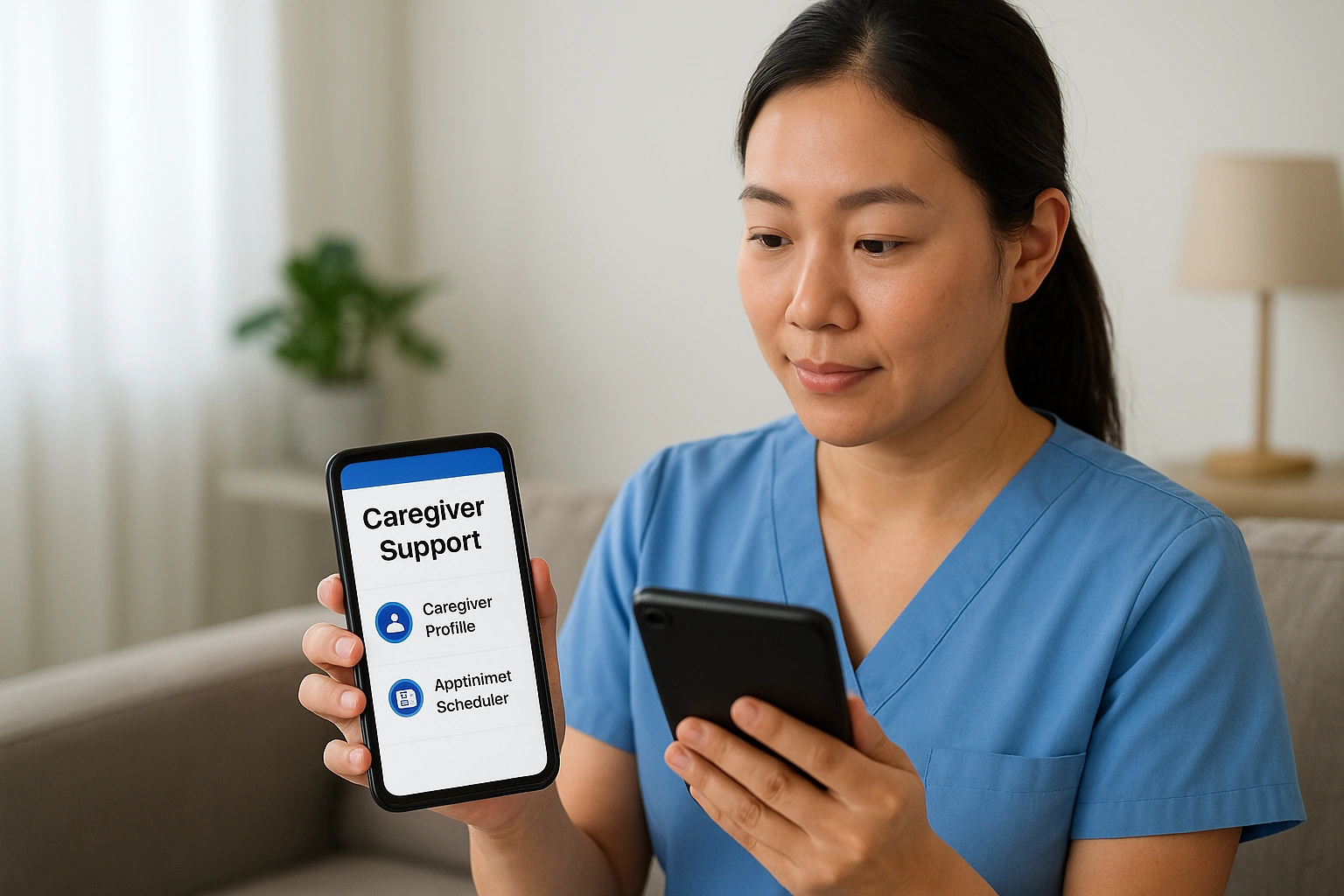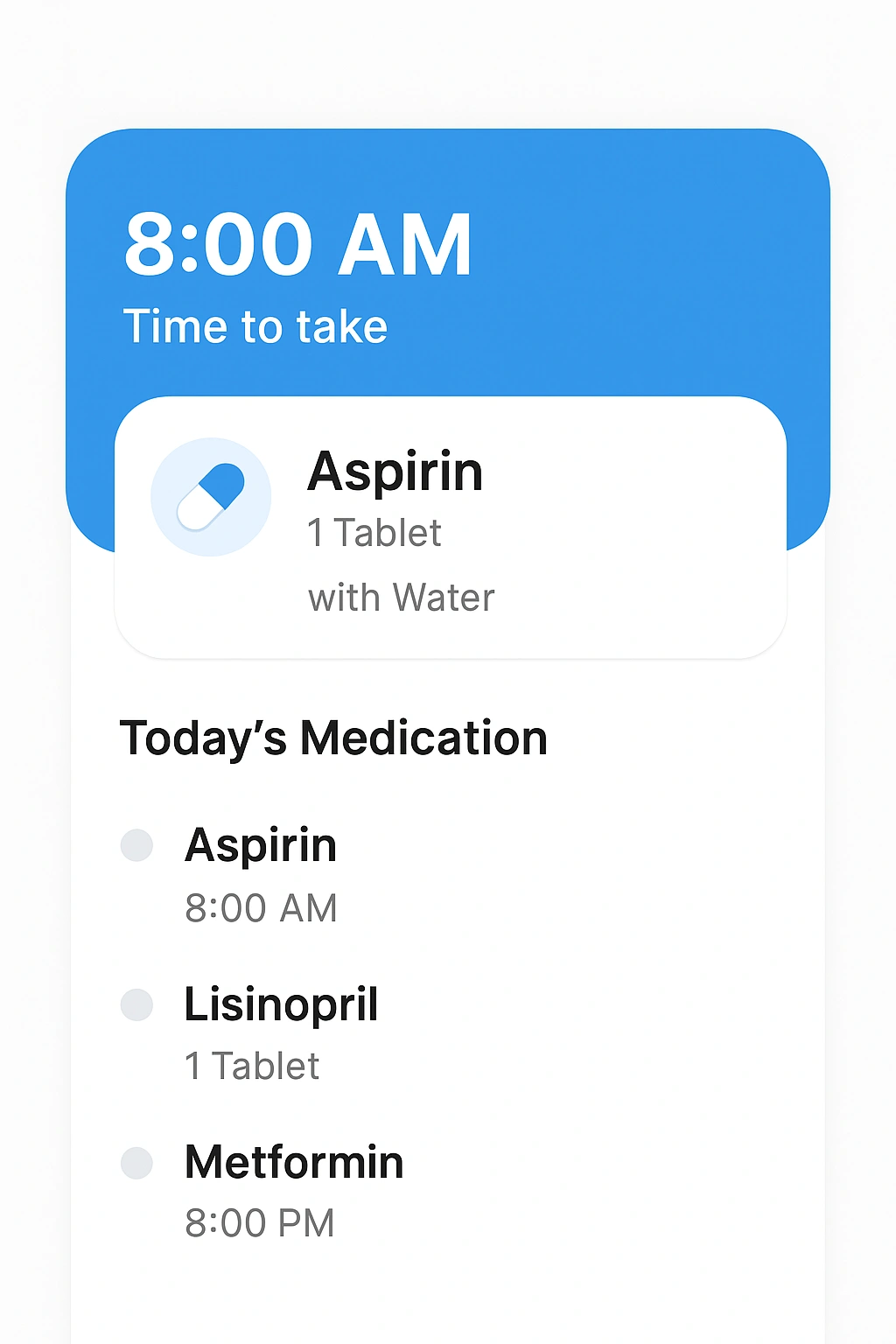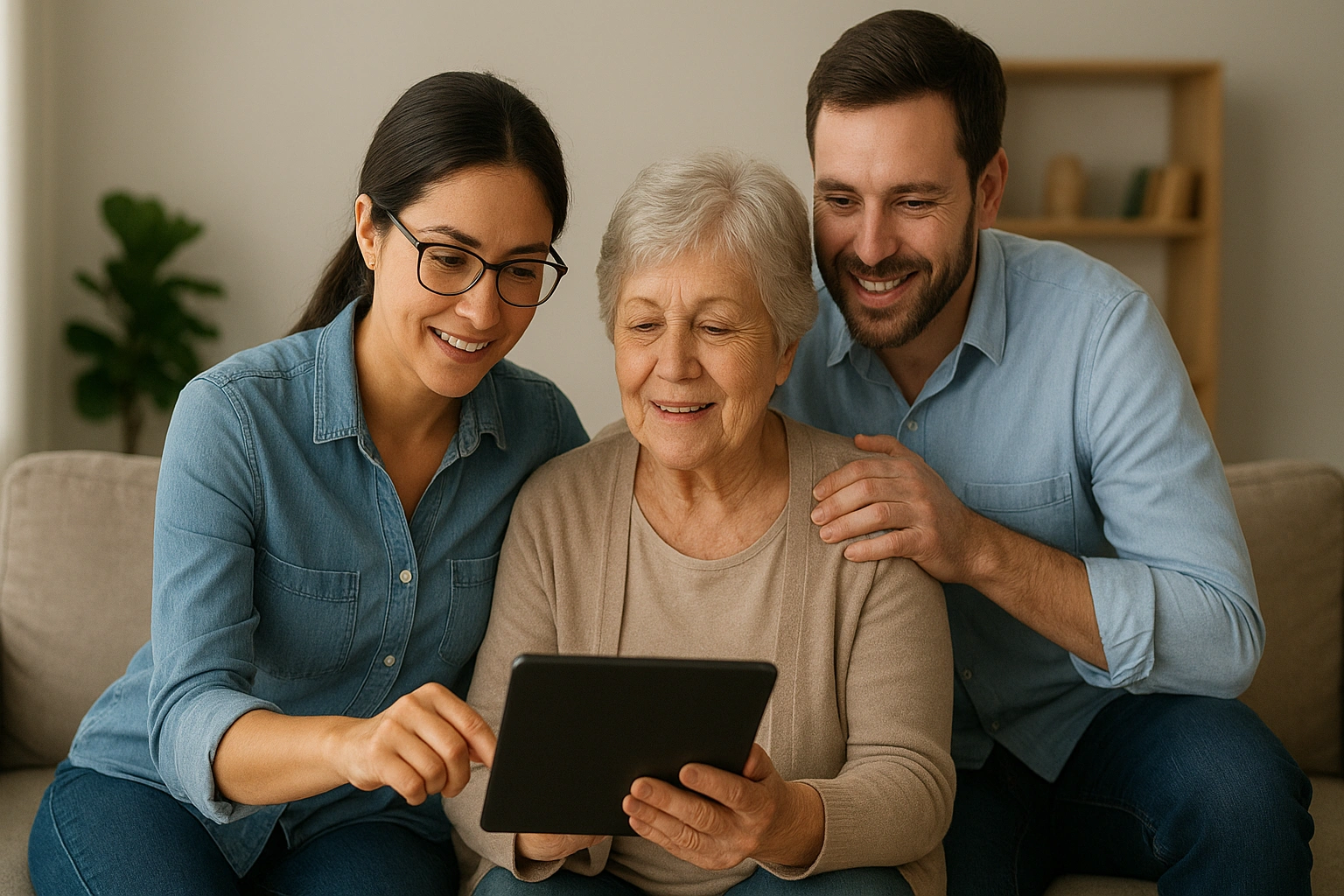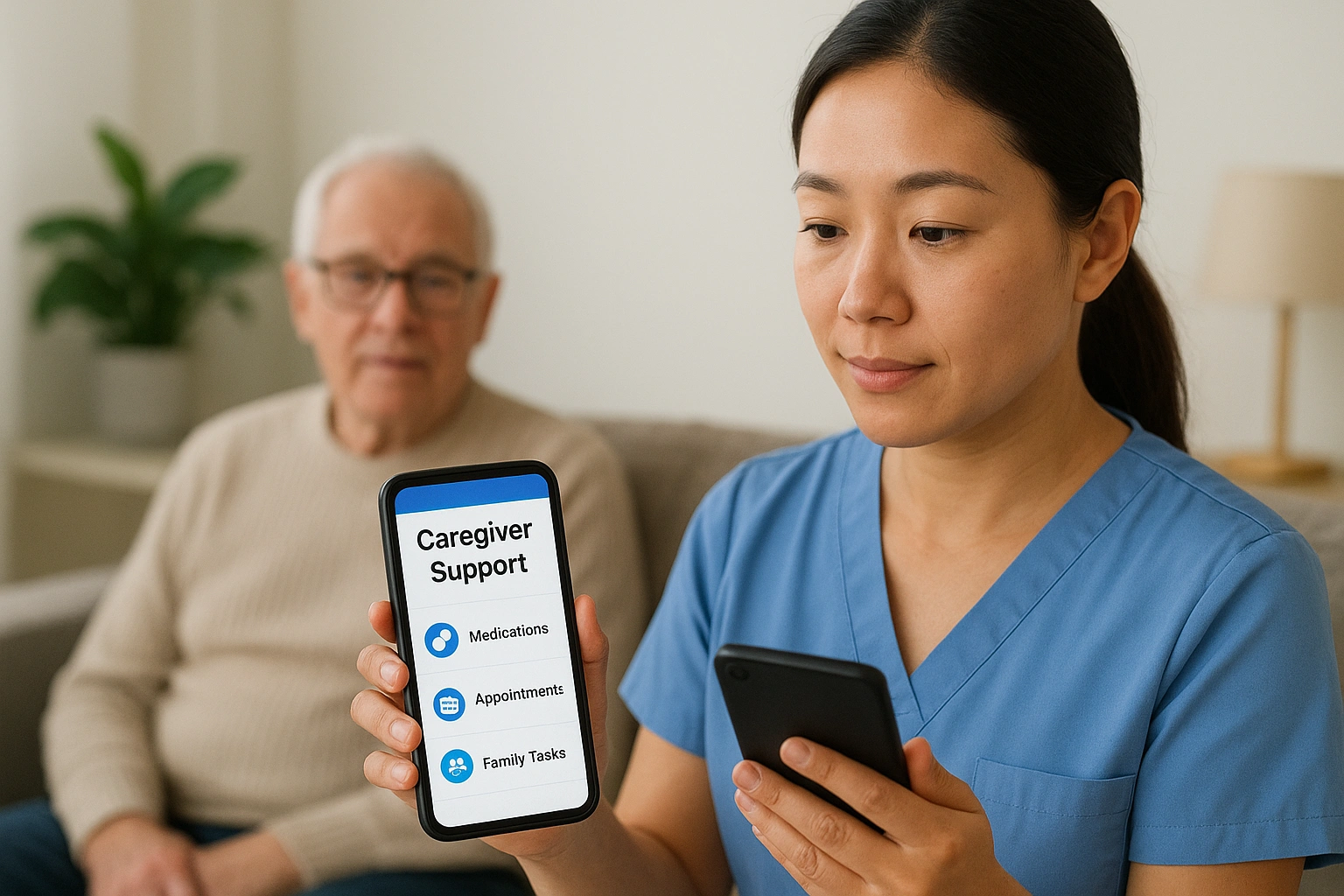
You’re trying to keep track of Mom’s medications, Dad’s doctor’s appointments, and your sister’s schedule for dropping off groceries—all while managing your own life. Caregiver support apps can act as a digital command center, bringing all these details into one organized place. With caregiver support apps, you can receive timely reminders, track medical information, and coordinate family tasks without the stress of scattered notes. Integrating caregiver support apps into your daily routine ensures nothing falls through the cracks and allows you to focus on caring rather than juggling logistics. By relying on caregiver support apps, the mental load of caregiving becomes more manageable and your family stays connected and informed.
Welcome to the world of caregiving technology, where the right caregiver support apps can transform chaos into smooth coordination and reduce anxiety. With the best caregiver support apps, you can monitor schedules, medications, and appointments all in one place. This guide highlights caregiver support apps that truly make a difference in 2025, cutting through the clutter to show what works. By using caregiver support apps strategically, you can care for your loved one more effectively, stay organized, and enjoy greater peace of mind on your caregiving journey.
What Are Caregiver and Senior Monitoring Apps?
These caregiver support apps are specialized mobile tools designed specifically for the challenges of family caregiving. Unlike generic apps, caregiver support apps focus on the unique demands of caring for an older adult. With caregiver support apps, you can centralize important information, automate reminders, and streamline communication among your care team. Using caregiver support apps also enhances the safety and well-being of your loved one while making your caregiving journey more organized and manageable.
The adoption of these tools is a major trend. As a Statista survey on digital health shows, more and more people are using technology to manage their health and the health of their families. For caregivers, these apps are no longer a novelty; they are becoming an essential part of the modern caregiving toolkit, offering a level of organization and oversight that was previously impossible.
The Powerful Benefits of a Digital Helping Hand
Integrating the right app into your caregiving routine can provide profound benefits for the entire family, especially for long-distance caregivers.
Centralized Information and Coordination
No more “Who’s taking Dad to his appointment on Tuesday?” A care coordination app puts everyone’s schedule, tasks, and important documents (like medication lists) in one shared, accessible place. This single source of truth prevents miscommunication and ensures everyone is on the same page.
Enhanced Safety and Peace of Mind
Senior monitoring tools, like GPS trackers or apps connected to fall detection devices, provide an invaluable safety net. For a caregiver, this translates to a significant reduction in constant worry, knowing that you will be alerted in an emergency.
Improved Medication Adherence
Medication errors are a major cause of hospitalization for seniors. A sophisticated medication management app not only reminds your loved one to take their pills but can also notify you if a dose is missed, providing a crucial layer of oversight. Many modern wellness strategies, discussed on sites like peternakan.web.id, emphasize the importance of technology in health management.
Key Features to Look For in Caregiver Apps
The world of apps can be overwhelming. Here are the core categories and features to help you narrow your search.

1. Care Coordination and Communication
Look for apps with a shared family calendar, task lists that can be assigned to different people, a secure messaging platform, and a place to store important documents and contacts.
2. Medication Management
The best apps offer customizable reminders (with different sounds and messages), a log to track taken and missed doses, refill reminders, and information about drug interactions.
3. Health and Symptom Monitoring
These features allow you to log daily vitals (like blood pressure), track symptoms, and create reports that you can easily share with doctors, providing a more complete picture of your loved one’s health over time.
4. Safety and Location Services
This category includes apps that can provide GPS location tracking, set up “geofences” that alert you if your loved one wanders outside a safe area, and connect to personal emergency response systems (PERS) for fall detection and one-touch emergency calls.
The Digital Caregiver: A Real-Life Scenario
Sarah lives three states away from her father, who has dementia. She uses a suite of caregiver support apps to manage his care. A GPS tracking watch gives her peace of mind about his location. A smart pill dispenser notifies her phone when he takes his medication. She coordinates with her local brother and a paid aide through a shared calendar app, where they all leave notes after their visits. This digital ecosystem allows Sarah to be a deeply involved and effective caregiver, despite the physical distance.
Comparing Top Apps for Different Needs
No single app does everything perfectly. Often, the best approach is to use a combination of apps that excel in specific areas.
| App/Service | Key Feature | Pros | Best For |
|---|---|---|---|
| CaringBridge | Health journey journal and updates | Excellent for sharing updates with a large group of family and friends. | Mass communication during a health crisis. |
| Medisafe | Medication reminders and tracking | Highly reliable, alerts caregivers if doses are missed. | Managing complex medication schedules. |
| Lotsa Helping Hands | Care calendar and task delegation | Makes it easy for people to sign up for specific tasks (meals, rides). | Coordinating help from a community of volunteers. |
| Medical Guardian | Personal Emergency Response | Reliable fall detection and 24/7 emergency monitoring. | Senior safety and emergency response. |
Common Mistakes to Avoid When Choosing an App
To ensure technology helps rather than hinders, avoid these common pitfalls.
- Choosing a “One-Size-Fits-All” App: An app that claims to do everything often does nothing well. It’s better to use two or three best-in-class apps for your specific needs.
- Forgetting About the Senior’s User Experience: If the app requires your loved one to interact with it, make sure the interface is simple, with large fonts and intuitive buttons.
- Ignoring the Onboarding Process: Don’t just download the app and expect everyone to use it. Schedule a family “training session” to get everyone comfortable with the features.
- Creating “Notification Overload”: Be selective about what alerts you receive. Getting an alert for every minor event can lead to notification fatigue and cause you to miss what’s truly important.
Expert Tips & Best Practices
Use these insider strategies to choose and implement technology like a pro.

- Start with Your Biggest Pain Point: “Don’t try to solve everything at once,” advises gerontechnologist Dr. Emily Reed. “Identify your single biggest daily stressor—is it medications? appointments?—and find an app that is laser-focused on solving that one problem.”
- Read Recent User Reviews: App performance can change with updates. Don’t rely on old reviews. Look at reviews from the last 3-6 months in the App Store or Google Play to get a current picture of its reliability.
- Test Customer Support: Before committing to a paid service, send a question to their customer support team. A quick and helpful response is a great sign of a well-run company.
- Involve the Primary Care Physician: Show your loved one’s doctor the health tracking app you’re using. Many physicians appreciate the organized data, which can lead to more productive appointments.
Frequently Asked Questions (FAQ)
Q: Are caregiver apps a substitute for professional medical care?
A: Absolutely not. Caregiver support apps are powerful organizational and monitoring tools, but they are not a substitute for professional medical advice or care. They are designed to support the care plan prescribed by a doctor, not to replace it. Always consult with a healthcare professional for medical concerns.
Q: How can I address privacy concerns with my parents about these apps?
A: Frame the conversation around safety and independence, not surveillance. Explain that these tools can help them live independently for longer by providing a safety net. Involve them in the selection process, choose apps with clear privacy policies, and start with the least intrusive features to build trust.
Q: Are there good free caregiver apps available?
A: Yes, many excellent apps offer robust features for free or have a ‘freemium’ model. Apps for care coordination (like Lotsa Helping Hands) and medication reminders (like Medisafe) often have very functional free versions. Paid subscriptions typically unlock more advanced features, but you can get significant value without spending money.
Q: What’s the most important feature to look for in a caregiving app?
A: The most important feature is the one that solves your biggest problem. If medication management is your main source of stress, a top-tier medication reminder app is key. If you’re coordinating with multiple family members, a shared calendar and communication hub is your priority. Start by identifying your primary pain point and choose an app that excels in that area.
Q: How do I get a tech-resistant senior to use these apps?
A: Start with apps that require minimal interaction from them. Many senior monitoring tools work passively in the background. For apps that need their input, like a health log, choose one with a very simple, large-button interface. Demonstrate the benefits clearly, be patient, and offer hands-on help to get them started.
Conclusion
In the complex world of caregiving, caregiver support apps can be a powerful ally. The right caregiver support apps help bring order to chaotic schedules, offering reminders, alerts, and organizational tools so you don’t have to carry everything in your head. By integrating caregiver support apps into your routine, you can streamline communication among family members and coordinate care more efficiently. Using caregiver support apps strategically allows you to reduce stress, maintain focus on what truly matters, and ensure your loved one receives consistent, attentive care. With caregiver support apps, managing the daily challenges of caregiving becomes more sustainable and less overwhelming.
For more insights into technology for seniors, publications like Wired often cover the latest innovations. Your digital toolkit is waiting.
What is the biggest organizational challenge you face as a caregiver? Share your experience in the comments!
